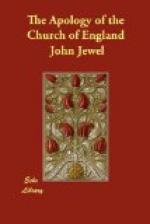* * * * *
Moreover, we allow the Sacraments of the Church, that is to say, certain holy signs and ceremonies, which Christ would we should use, that by them He might set before our eyes the mysteries of our salvation, and might more strongly confirm our faith which we have in His blood, and might seal His grace in our hearts. And these Sacraments, together with Tertullian, Origen, Ambrose, Hierom, Chrysostom, Basil, Dionysius, and other Catholic fathers, do we call figures, signs, marks or badges, prints, copies, forms, seals, signets, similitudes, patterns, representations, remembrances and memories. And we make no doubt, together with the same doctors, to say, that these be certain visible words, seals of righteousness, tokens of grace: and do expressly pronounce, that in the Lord’s Supper there is truly given unto the believing the body and blood of the Lord, the flesh of the Son of God, which quickeneth our souls, the meat that cometh from above, the food of immortality, grace, truth, and life, and the Supper to be the communion of the body and blood of Christ; by the partaking whereof we be revived, we be strengthened, and be fed unto immortality; and whereby we are joined, united, and incorporate unto Christ, that we may abide in Him, and He in us.
Besides, we acknowledge there be two Sacraments, which, we judge, properly ought to be called by this name; that is to say, Baptism and the Sacrament of thanksgiving. For thus many we say were delivered and sanctified by Christ, and well allowed of the old fathers, Ambrose and Augustine.
* * * * *
We say that Baptism is a Sacrament of the remission of sins, and of that washing, which we have in the blood of Christ; and that no person which will profess Christ’s Name ought to be restrained or kept back therefrom; no, not the very babes of Christians; forsomuch as they be born in sin, and do pertain unto the people of God.
We say, that Eucharistia, that is to say the Supper of the Lord, is a Sacrament; that is to wit, an evident token of the body and blood of Christ, wherein is set, as it were, before our eyes, the death of Christ and His resurrection, and what act soever He did whilst He was in His mortal body: to the end we may give Him thanks for His death, and for our deliverance: and that, by the often receiving of this Sacrament, we may daily renew the remembrance of that matter, to the intent we, being fed with the [true] body and blood of Christ, may be brought into the hope of the resurrection and of everlasting life, and may most assuredly believe that the body and blood of Christ doth in like manner feed our souls, as bread and wine doth feed our bodies. To this banquet we think the people of God ought to be earnestly bidden, that they may all communicate among themselves, and openly declare and testify both the godly society which is among them, and also the hope which they have in Christ Jesu. For this cause if there had been any which




